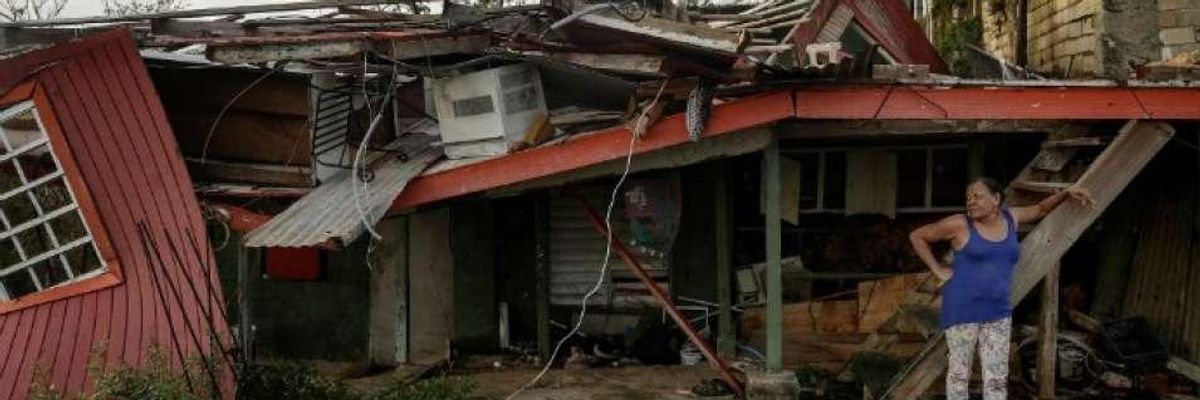While 2017 was the costliest year ever for destruction from extreme weather events--and even as much of Puerto Rico is still struggling with a slow and "dehumanizing" recovery nearly six months after Hurricane Maria--a look at the new Federal Emergency Management Agency (FEMA) four-year strategic plan reveals there is not a single mention of "climate change" or "global warming."
The document (pdf), as Bloomberg points out, "doesn't mention climate, global warming, sea-level rise, extreme weather, or any other terminology associated with scientific predictions of rising surface temperatures and their effects." With this "dangerous" decision, FEMA's 2018-2022 strategy departs from the version developed under the Obama adminitration, which "repeatedly cited the challenges caused by a changing climate, and the need for FEMA to incorporate those risks into its long-term plans."
The new plan claims that "[l]arge scale, complex incidents, including FEMA's responses to Hurricanes Harvey, Irma, and Maria, as well as the 2017-2018 California wildfires, underscore the criticality of our shared mission and remind us of the importance of learning from past disasters" and acknowledges that "[d]isaster costs are expected to continue to increase due to rising natural hazard risk, decaying critical infrastructure, and economic pressures that limit investments in risk resilience."
However, despite the record-breaking costs of natural disasters last year, FEMA's new plan fails to mention the how global warming--largely driven by greenhouse gas emissions generated by fossil fuel use--is fueling the "rising natural hazard risk" and has exacerbated these recent disasters.
Although the exclusion of climate science from the strategy document aligns with actions of other agencies under President Donald Trump, it still provoked swift condemnation and concern:
Rachel Cleetus, lead economist and climate policy manager at the Union of Concerned Scientists, said the move "demonstrates the chilling effect the Trump administration's denialism is having on vital work of federal government agencies." Considering that FEMA's responsibilities include helping communities prepare for and respond to events like the series of intense hurricanes that struck the Caribbean and Southern U.S. last year, she added, "muzzling agencies from speaking out about climate change and preventing them from planning for its impacts is a recipe for disaster."
This is far from the first time FEMA has faced a wave of criticism since Trump took office. During the ongoing recovery effort in Puerto Rico, the agency, as Democracy Now!noted last month, "has been hit by a series of scandals, after it was revealed that only a fraction of the 30 million meals slated to be sent to the island after Hurricane Maria was actually delivered."
"FEMA approved a $156 million contract for a one-woman company to deliver the 30 million meals. But in the end, FEMA canceled the contract after she delivered only 50,000 meals, in what FEMA called a logistical nightmare," the news show reported. "This came after FEMA gave more than $30 million in contracts to a newly created Florida company which failed to deliver a single tarp to Puerto Rico."
